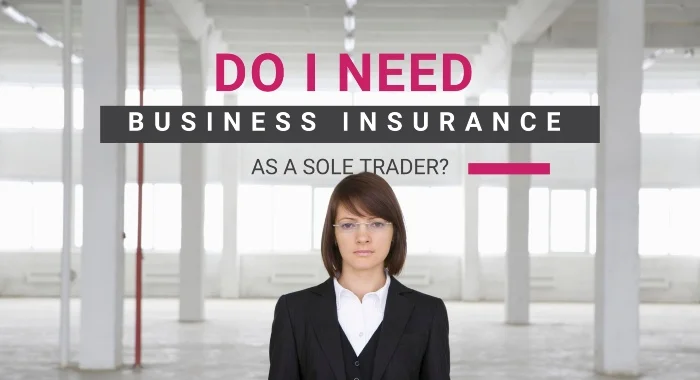Being a sole trader can offer up a lot of freedom that a lot of other business types just don’t offer.
You can be your own boss, you can make decisions without having to involve others, and you can set up as a sole trader without any big expenses or hours of paperwork.
But with the freedom of being a sole trader, you also take on a lot of responsibilities and are solely accountable for the success or failure of your company. Now, this isn’t meant to make you panic, as we’re here to give you all the business advice and tips you need to succeed.
If you’re asking if insurance is one of those things your business needs, you’ve come to the right place. In this article, we’ll be answering the question ‘do I need business insurance as a sole trader’, clearing up all confusion and setting you up for success.
Let’s dive in, shall we?
Your insurance requirements depend on your business activities
Sole traders by themselves don’t have any legal requirements to take out any type of business insurance. However, depending on the type of work that you do, you may be contractually obligated to take out:
- Public liability insurance. This insurance covers any compensation claims if your business is held responsible for causing an injury or property damage. For example, if you work in trade and a pipe bursts during one of your installations, or if someone wanders into a construction site and is hit by a falling bit of debris. You can take out this type of insurance to cover between £1-£10 million. Depending on your work and the contracts you take out, there may be a minimum amount of coverage that you’re expected to take.
- Personal indemnity insurance. Personal indemnity insurance protects your business in case any professional advice or service that you offer fails to work for a client. For example, if you work as a consultant and give advice that causes a client to lose money. This type of cover can cover trade work as part of a service. For example, if a client claimed that a poor electrical installation caused them to close their shop and lose income.
If you’re working somewhere that requires you to handle client data or websites, you may also need cyber and data insurance to protect this information.
There are also different types of insurance you may need to carry out certain parts of your job. For example, if part of your business involves driving, then you need to make sure that you’re covered for that particular activity.
Being a sole trader doesn’t give you immunity against other laws I’m afraid.
Lost the buzz for your business?
Starting a business is exciting. Succeeding is rewarding. The bit between is hard, repetitive, and full of self-doubt.
The Lonely Middle Club (From Business4Beginners) helps you through it:
Get support and advice from other small business owners
Remove the self-doubt that’s holding your business back
Learn techniques and strategies to grow your business faster
Be inspired with our exclusive ‘swipe’ file and AI-powered tools
No pressure – work at YOUR pace, towards YOUR goals
—
Employers are legally required to take out employer’s liability insurance
If you have an employee work for you, it’s a legal requirement to have employers’ liability insurance.
This insurance policy protects and covers your business for any claims an employee makes about an injury, damage, or loss while working for your company.
If you are a team of one as a sole trader, you don’t need this insurance.
Other insurance types are optional, but recommended
Just because you might not be obligated to take out business insurance, doesn’t mean that it won’t benefit you. Sometimes having insurance just helps us sleep better at night and gives us that peace of mind to know if anything goes wrong, you’ve got that cover to fall back on.
Having insurance up your sleeve could also help you win more clients. Having insurance doesn’t just give you peace of mind, but can also put your clients at ease and make them more comfortable working with you.
Business insurance types to bear in mind
If you’re wanting to protect yourself and your business with insurance, the next step is to figure out what type of insurance that you need.
This is the complicated bit, as there’s a variety of insurance policies that you can take out as a sole trader, including:
Public liability insurance
If you’re wanting to protect yourself and your business with insurance, the next step is to figure out what type of insurance that you need.
This is the complicated bit, as there’s a variety of insurance policies that you can take out as a sole trader, including:
Personal accident insurance
Personal accident insurance is one of the biggest ways to protect your income if you can’t work. If you suffer an injury or accident that forces you out of work, this insurance will be able to cover your lost revenue.
Buildings & contents insurance

This insurance policy protects the physical place that you work, as well as the physical contents and equipment that you have. For example, if you have an office that is flooded, or has a break-in, this insurance will cover the cost of repairs and replacements.
A lot of sole traders work from their own homes and may think that they don’t need additional building or contents insurance. But a lot of residential home insurance policies don’t cover business needs, so you may need to add your business to your current policy.
Tool and equipment cover
If your business as a sole trader relies on certain equipment, you want to make sure that you have extra protection in case of loss, theft or damage to your tools.
This is especially important for tradespeople, but can also be carried out on computers or laptops if you offer digital services.
Vehicle insurance
Use a car or van as part of your business? You will need to make sure that your insurance covers this use, as regular domestic car insurance won’t cover you for any incidents that happen while working. What’s more, it could invalidate the current insurance that you have.
Build an insurance package for your business
Thankfully, you don’t have to take out each insurance policy separately.
If you take out a general sole trader or business insurance package, they will usually build your cover of these different insurances depending on your needs. This means you’ll have one policy that covers all these areas, like taking out a multi-cover policy to cover your house, car and life insurance.
Depending on the provider and the package, there may be some insurance types that you have to take out separately.
This usually applies to vehicle insurance, which you would want to talk to your current car insurance provider about, and tools and equipment hire which you may want to get from a different place.
For greater protection, consider forming a limited company
If you want greater protection, you may want to consider becoming a limited company instead. This is where you set up your business as an incorporated company, meaning it classes as its own legal entity.
As a limited company, your business stands alone. It can own its own property and enter contracts, which means any debts that it might acquire are attached to the business alone, not to you, giving you a greater layer of protection should the worst happen.
In addition to reduced risk, a limited company:
- Is more tax-efficient, giving you greater tax rates and allowable expenses that you can claim back.
- Can be seen as more professional, helping you earn bigger contracts.
- Has more financial backing, allowing you to gain loans and investments as a business.
If you’re ready to make the switch, read our guide on forming a limited company here.
Not quite sure yet? Let us help you make up your mind with this guide on whether you should be a sole trader or a limited company.
Do I need business insurance as sole trader: a summary
You’re only obligated to have business insurance as a sole trader when you enter into a contract that requires having it. As a sole trader, it’s up to you to decide if you need insurance or not.
There are different types of insurance that you can get, but if you’re looking for peace of mind and a way to protect your income and your business if the worst should happen, you may want to consider getting insured.
If you think you need greater protection than the insurance listed here, you may want to consider setting your business up as a limited company instead of a sole trader.
Although you’ll have more legal requirements to adhere to, you’ll also have greater protection for your company and a separation between your personal assets, which means you’ll never be personally liable for any debts your business may incur.
Looking for more advice for your business?
- Find more legal advice and information you should know about running your business here.
- Discover accounting solutions and help to keep your books in order here.
- Get helpful advice and tips on how to market your business online and bring in more customers here.
- Not sure what to do next? Get inspired with our ideas here.
No matter what your business needs, Business4Beginners is here for you.







